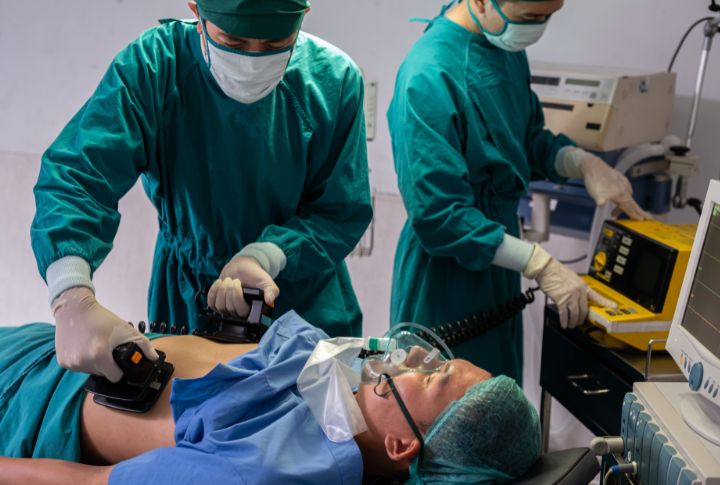
Death is an inevitable part of the human journey, but its precise timing remains uncertain. However, our bodies often provide subtle clues when life’s final chapter may be approaching. By recognizing these signs, loved ones can offer comfort, have meaningful conversations, and prepare to celebrate a life well-lived. In this article, we’ll examine 15 physical and medical indicators that someone is almost passing on.
Sleeping More

As energy reduces, your loved one may spend much time resting or sleeping. This is their body’s natural way of preserving its remaining strength. They may slip into a semi-conscious state where they’re easily woken but quickly drift back to sleep. These extended periods of deep rest, perhaps only waking for short periods, should not scare you. Provide a calm and comfortable environment for the rest they need.
Changing Vital Signs

Be attentive to shifts in body temperature, breathing patterns, and blood pressure outside normal ranges. For example, their skin may become increasingly cool to the touch as circulation slows and blood is prioritized for vital organs. Breathing may develop a distinct, audible rattle as fluids gather in the throat and lungs. Blood pressure often drops significantly in the final weeks as the cardiovascular system falters. While unsettling, these irregular vital signs signify their body’s transition.
Incontinence Issues

Losing control of their bladder and bowel movements may occur as their muscles relax in the final stage of their journey. This lack of control may be unpleasant, but it isn’t intentional—they’ve simply lost control of their muscles. Just respond with patience and reassurance while tending to any accidents. Also, have absorbent underwear or pads available, and consider protective bedding.
Constipation

Constipation can also become a problem as the body reaches its end. This is due to intestinal muscles not contracting regularly enough to produce healthy stool. If approved by a doctor, simple stool softeners, mild laxatives, or gentle abdominal massages can sometimes provide temporary relief. However, constipation may persist as bodily functions stop operating.
Muddled Senses

In this stage of life, your loved one’s sense of sight and hearing may become distorted or fail them entirely. The world can become hazy, or their hearing may be slower as if their ears were stuffed with cotton. They may struggle to make out people, voices, or surroundings that once felt familiar. Speak calmly and naturally, continuing to identify yourself despite their confusion. Holding their hand or playing soft, soothing music can also provide comfort during this challenging period.
Increased Bruising

One of the body’s final changes is the skin and tissues becoming delicate. This can cause bruises and unsightly discoloration from minor bumps or scrapes. Avoid any unnecessary pinching, prodding, or friction against their skin. Instead, gently apply moisturizer while being cautious of any cracks, tears, or open wounds that need medical attention.
Involuntary Movements

Jerking limbs, twitching or clenched fists, and toes may manifest as their nervous system loses control over muscle movements. Don’t mistake these involuntary motions for signs of unrest or pain. They are reflexive responses as the brain’s control of the body slips away. Speak softly and rub their arms and legs in slow, firm motions to provide comfort.
Sunken Aging

As fat stores and muscle mass rapidly break down in these closing weeks, your loved one’s facial features may appear older. Sunken cheeks, temples, eye sockets, and papery, thin skin can create a shocking, frail appearance. This dramatic “aging” look represents their body’s final transition after sustaining them through life.
Restlessness and Anxiety

Periods of restlessness or panicked, agitated motions from your loved one may occur as their brain’s chemistry continues transforming. These moments of internal confusion and fear are reflective of the changes underway. Carefully speak in a soothing, reassuring voice or play gentle music to comfort them. A light, firm massage can also help ease this anxiety until the episodic unrest passes.
Eye Movement Changes

Among the final outward signs, your loved one’s eyes may lose their ability to focus or track movement around them actively. Their gaze may fix and go blank, appearing to stare into the distance unfocused. The eyes may also wander and roam without control as the muscles controlling their pupils relax. Speaking softly, playing calm music, or tenderly holding their hand can provide reassurance until their journey is completed.
When Pain Becomes Harder to Manage

While doctors try to prevent suffering at the end of life, pain can sometimes break out as the body shuts down. Your loved one may show discomfort like grimacing, clenching their hands, or labored breathing. This can signal issues like intestinal blockages, tumor pressures, or inflammation from poor circulation. But that doesn’t mean they should be left to suffer. Communicate these concerns so pain medication or other palliative care can be provided. With proper support, their final days can be more peaceful.
The Inward Turn Towards Rest

Another critical indication of death approaching is when your loved one becomes less social. Though the decreasing interaction can hurt, try to understand it’s just fatigue rather than a lack of affection for you. Keep speaking softly and attending to their needs despite this inward shift.
Nausea and Vomiting

Persistent nausea or vomiting may be an unpleasant sign that the end is near. This can stem from a buildup of toxins, metabolic abnormalities, medications, or obstructions in the digestive tract as it loses functionality. It simply indicates that the body is purging what it no longer requires. To ease this discomfort, provide gentle reassurance, medication, hydration, and personal cleaning care approved by their medical team.
Hallucinations Become Frequent

As the body nears the end, your loved one may start hallucinating. They might see family members who have passed away or mention a bright, warm light. Or they could get upset over shadows or things they think are there but aren’t. While this can be upsetting to witness, it’s best not to argue or tell them they’re wrong. Their mind is just working differently now. The kind approach is to calmly reassure them about what they describe rather than disagree.

Comments
Loading…